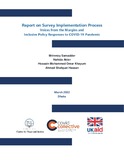| dc.contributor.author | Samadder, Mrinmoy | |
| dc.contributor.author | Akter, Nahida | |
| dc.contributor.author | Mohammed Omar Khayum, Hossain | |
| dc.contributor.author | Shafquat Hassan, Ahmed | |
| dc.date.accessioned | 2022-05-26T10:29:35Z | |
| dc.date.available | 2022-05-26T10:29:35Z | |
| dc.date.issued | 2022-03 | |
| dc.identifier.citation | Samadder, M.; Akter, N.; Mohammed Omar Khayum, H. and Shafquat Hassan, A. (2022) 'Voices from the Margins and Inclusive Policy Responses to COVID-19 Pandemic: Report on Survey Implementation Process', Covid Collective, Dhaka: BRAC University | en |
| dc.identifier.uri | https://opendocs.ids.ac.uk/opendocs/handle/20.500.12413/17428 | |
| dc.description.abstract | The Centre for Peace and Justice (CPJ), Brac University is currently implementing a
research project to create an information data-loop to inform and influence public policies
and state responses on COVID-19 related relief, recovery and resilience measures.
Based on a representative household panel of marginalised groups in Bangladesh, the
project has been tracking their understanding of and demand for healthcare policies and
responses. The proposed research aims at collecting citizen feedback through ICT tools,
on a set of pre-defined indicators. In this regard, three rounds of surveys in panel setting
would be undertaken using ICT devices (using an appropriate platform, example android)
with a pre-loaded questionnaire. A tracking system (e.g. GIS) on the device would help
indicate the location from where data is collected thereby enhancing the reliability of data
collection and enabling a “granular” analysis at the disaggregated level.
The key output of the project is a validated and real-time public facing web-based portal
which will provide a rapid feedback loop for systematic curation, analysis and reporting of
public perception and feedback from five marginalised groups. Marginalisation is
conceptualised in this project as both a process and a condition that prevents individuals
or groups from full participation in social, economic, and political life. Marginalised
population would mean those groups who have no influence over the ways in which the
responses to mitigate the impacts of COVID-19 are crafted and implemented and hence,
be ‘passive’ or ‘coerced’ receptors of policies and response measures. | en |
| dc.description.sponsorship | Foreign, Commonwealth and Development Office (FCDO) | en |
| dc.language.iso | en | en |
| dc.publisher | BRAC University | en |
| dc.rights.uri | https://www.nationalarchives.gov.uk/doc/open-government-licence/version/3/ | en |
| dc.subject | Health | en |
| dc.title | Report on Survey Implementation Process:
Voices from the Margins and
Inclusive Policy Responses to COVID-19 Pandemic | en |
| dc.type | Other | en |
| dc.rights.holder | © Crown copyright 2021 and Centre for Peace and Justice 2022 | en |
| rioxxterms.funder | Default funder | en |
| rioxxterms.identifier.project | Default project | en |
| rioxxterms.version | VoR | en |
| rioxxterms.funder.project | 9ce4e4dc-26e9-4d78-96e9-15e4dcac0642 | en |

